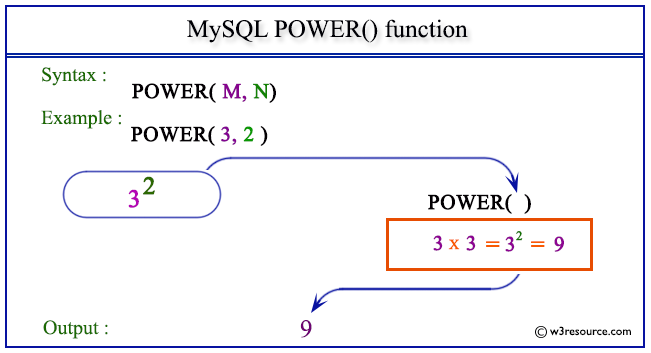MySQL POWER() function
POWER() function
MySQL POWER() returns the value of a number raised to the power of another number. The synonym of POWER() is POW().
This function is useful in -
- POWER() is essential for modeling phenomena involving exponential growth or decay, such as compound interest, population growth, radioactive decay, and more.
- POWER() is a key component in many scientific formulas, especially those that involve exponential relationships.
- In finance, POWER() is crucial for calculating compound interest and determining future values of investments.
- To compute the power of a signal the POWER() is fundamental in telecommunications, audio processing, image processing, and other fields where signal analysis is essential.
- POWER() is utilized in probability and statistics for various calculations, including likelihood ratios, likelihood functions, and power functions in hypothesis testing.
- In thermodynamics and heat transfer, POWER() is applied to model temperature distributions, heat transfer rates, and other phenomena involving exponential relationships.
Syntax:
POWER(M,N);
Arguments:
| Name | Description |
|---|---|
| M | A number which is the base of the exponentiation. |
| N | A number which is the exponent of the exponentiation. |
Syntax Diagram:

MySQL Version: 8.0
Pictorial presentation of MySQL POWER() function

Example of MySQL POWER() function
Code:
SELECT POWER(3, 2);
Explanation:
The above MySQL statement returns the value of 32, i.e. 9.
Output:
mysql> SELECT POWER(3, 2); +-------------+ | POWER(3, 2) | +-------------+ | 9 | +-------------+ 1 row in set (0.00 sec)
Example : POWER() function with negative value
Code:
SELECT POWER(4,-2);
Explanation:
The above MySQL statement returns the value of 4-2, i.e. 0.0625.
Output:
mysql> SELECT POWER(4,-2); +-------------+ | POWER(4,-2) | +-------------+ | 0.0625 | +-------------+ 1 row in set (0.00 sec)
- Weekly Trends and Language Statistics
- Weekly Trends and Language Statistics